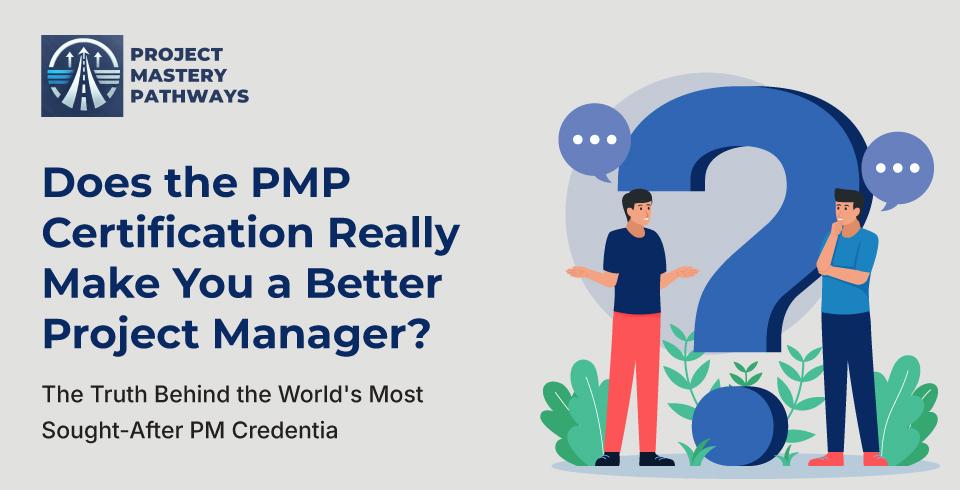You’ve spent countless hours researching project management certifications, and one question keeps nagging at you: “Will the PMP certification actually make me a better project manager, or is it just an expensive piece of paper?” This doubt is more common than you think. With over 1.3 million PMP credential holders worldwide as of 2024, many aspiring project managers wonder if this globally recognized certification translates into real-world project management excellence. If you’re questioning whether investing time, money, and effort into PMP certification will genuinely enhance your project management capabilities, this comprehensive analysis will provide you with the clarity you need to make an informed decision.
Understanding What the PMP Certification Actually Teaches You
The Project Management Professional (PMP) certification, administered by the Project Management Institute (PMI), is built around the PMBOK Guide and covers five key performance domains: People, Process, Business Environment, Predictive Planning and Management, and Agile Frameworks. But does learning these domains actually improve your project management skills?
The PMP certification does more than test your memorization of project management terminology. It fundamentally changes how you approach project challenges by providing a structured framework for decision-making. The certification process exposes you to global best practices, standardized methodologies, and proven techniques that have been refined over decades of collective project management experience.
One of the most significant benefits is the development of a common project management language. When you understand concepts like Earned Value Management (EVM), critical path analysis, and risk assessment matrices, you can communicate more effectively with stakeholders, team members, and other project managers worldwide. This shared vocabulary becomes particularly valuable in complex, multi-stakeholder environments where clear communication can make or break project success.
The PMP also emphasizes the importance of soft skills, including leadership, negotiation, and conflict resolution. These people-focused competencies are often overlooked in technical training but are crucial for project success. Studies consistently show that project failures are more often attributed to people-related issues than technical problems.
The Real-World Impact: Skills vs. Experience Debate
Critics often argue that the PMP certification is too theoretical and doesn’t reflect the messy reality of actual project work. There’s some validity to this concern – no certification can replace hands-on experience dealing with difficult stakeholders, changing requirements, or resource constraints.

However, recent research from PMI’s Pulse of the Profession reports indicates that organizations with more than 35% of project managers holding PMP credentials have significantly higher project success rates. These organizations complete 89% of projects successfully compared to 36% in organizations with fewer certified project managers.
The key lies in understanding that the PMP certification provides you with a toolkit of proven methodologies and frameworks. While real-world projects rarely follow textbook scenarios, having this foundation helps you adapt established practices to unique situations. For instance, understanding various project life cycle approaches enables you to select the most appropriate methodology for each specific project context.
The certification also forces you to think systematically about risk management, stakeholder engagement, and quality assurance – areas that many project managers handle intuitively but could benefit from more structured approaches. This systematic thinking becomes particularly valuable as you progress to managing larger, more complex projects.
Beyond the Credential: How PMP Transforms Your Professional Approach
The PMP certification process itself is transformative. The requirement for 35 hours of formal project management education and 4,500-7,500 hours of project management experience (depending on your educational background) ensures that candidates have both theoretical knowledge and practical application before attempting the exam.
This combination creates a unique learning experience where you constantly connect classroom concepts with real-world challenges. Many professionals report that studying for the PMP helped them identify gaps in their current approach and introduced them to techniques they immediately implemented in their ongoing projects.
The certification also positions you within a global community of practice. PMP holders often find it easier to transition between industries, organizations, and even countries because they share a common understanding of project management principles. This portability becomes increasingly valuable in today’s dynamic job market.
Furthermore, the PMP’s emphasis on continuous learning through Professional Development Units (PDUs) ensures that certified professionals stay current with evolving project management trends, including agile methodologies, digital transformation, and emerging technologies. This requirement for ongoing education helps prevent the stagnation that can occur when professionals rely solely on experience without formal learning opportunities.
Making the Decision: Is PMP Right for Your Career Goals?
The question isn’t whether the PMP certification automatically makes you a better project manager – it’s whether the structured learning, global recognition, and professional development it provides align with your career objectives and learning style.
The PMP certification is most beneficial for professionals who want to formalize their project management knowledge, advance to senior PM roles, or work in organizations that value standardized approaches. It’s particularly valuable for those managing large-scale, complex projects where systematic approaches and stakeholder communication are critical.
However, the certification may be less immediately impactful for professionals in highly specialized technical roles or those working in very small organizations with informal project structures. In these cases, other certifications or focused skill development might provide more direct value.
The PMP certification doesn’t guarantee you’ll become a better project manager overnight, but it provides the foundation, framework, and credibility that can significantly enhance your project management capabilities when combined with practical application and continuous learning.
Ready to take your project management skills to the next level? Explore comprehensive PMP exam preparation and advanced project management techniques on my YouTube channel PMPwithRay, where I break down complex concepts into actionable insights. For structured learning paths and in-depth training, check out my project management courses on Udemy to build the expertise that will truly make you a better project manager.

